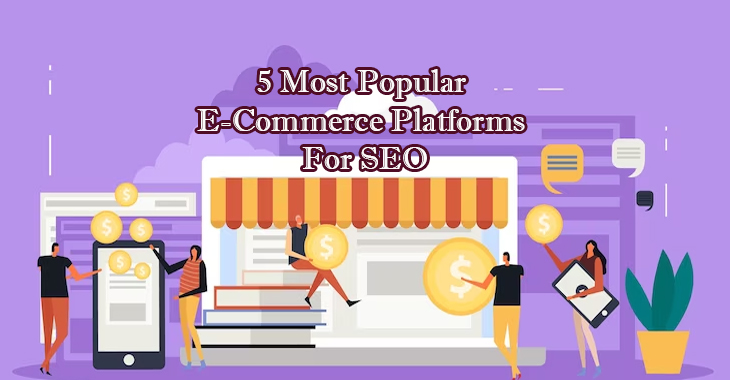
E-commerce Search engine optimisation (SEO) is a free way to increase the visibility of your website on search engine results pages (SERPs). One of the most crucial components of any e-commerce website is SEO. You won’t be able to drive visitors to or generate leads from your website without it. You must optimise your website for better search engine rankings because SEO is crucial for e-commerce companies. Making sure your keywords are in the appropriate places is the main focus of on-page SEO for ecommerce systems. It helps to ensure that Google understands exactly what your page is about. Because it aids in your appearance in additional Search Engine Results Page (SERP) elements, on-page SEO is crucial.
You make the decision to use Google to seek for an ecommerce platform to host your website and look for SEO (search engine optimisation) services that will help you rank in search results. The eCommerce platform you pick has a big impact on your success, whether you’re starting your first e-commerce business or expanding an established one. The best e-commerce platform is essential, and you should pay attention to factors like how easy it is for customers to find you and how efficiently your firm functions.
Some popular Ecommerce platforms for SEO are:
1. BigCommerce
2. WooCommerce
3. Adobe Commerce (Magento)
4. Wix
5. Shopify
1. BigCommerce

BigCommerce is an e-commerce platform that offers retailers software as a service and is listed on the NASDAQ. The platform of the firm offers services including building online stores, SEO, hosting, marketing, and security for small- to enterprise-sized businesses.
One of the top ecommerce platforms for businesses looking to create an online store is BigCommerce. BigCommerce is quite well-liked since it’s simple for non-programmers to utilise. BigCommerce is the finest option if you’re seeking for an eCommerce SEO platform that is both well-liked and SEO-friendly. Some of the most well-known companies in the world use it, including Hilton Hotels, Rebecca Minkoff, and Skullcandy.
It has a built-in SEO tool that enables you to optimise your website for higher search engine ranks, among other features; an extensive selection of plugins and themes you may utilise to tailor your store; An intuitive design that makes it simple for customers to browse your store and find what they need.
If you’ve never built a website before, you need something that will make it simple for you to do so. BigCommerce is a fantastic choice for you because it is incredibly customizable and doesn’t require any coding skills. It has good SEO. Start by looking for SEO-friendly features from ecommerce site builders if you want to know how to pick the finest ecommerce platform for SEO.
Many SEO-friendly features are available with Big Commerce, such as mobile-friendly design, built-in 301 redirects, SEO-friendly URLs, edit access to your.txt file, etc. Among the top SEO ecommerce platforms because of its user-friendliness. Additionally, you may leverage the many ecommerce website features that this platform provides to improve the shopping for your audience.
Pages can load slowly while utilising BigCommerce, among other limitations. BigCommerce users frequently remark that your website’s pages can load slowly. Users don’t want to wait for sites to load, so slow-loading pages are bad for SEO. Because slow-loading pages result in worse ranks, which translate into reduced traffic and lower revenues, this disadvantage should be taken into account.
2. WooCommerce

An open-source e-commerce plugin for WordPress is called WooCommerce. It is intended for medium-sized to large-sized WordPress-based online retailers. The plugin, which was released on September 27, 2011, quickly gained popularity due to its ease of installation and customization as well as the market position of the underlying product as freeware.
WooCommerce is the way to go if you’re searching for an eCommerce platform that is both affordable and SEO friendly. It is a WordPress plugin that transforms your website into a fully functional online store. It can be used to market services as well as tangible or digital goods.
Some of its characteristics include an SEO-friendly layout that raises the visibility of your website on search engine results pages; a user-friendly layout that makes it simple for visitors to your store to navigate and locate what they’re looking for; a large selection of customizability choices so you may design a distinctive store that represents your business. With the use of this tool, you can fully manage your SEO, including title tags, meta descriptions, product descriptions, and URLs. The integrated blogging feature of WooCommerce can also be used to produce material that can boost your SEO.
WooCommerce is a fantastic alternative for your e-commerce business if you are comfortable with WordPress. You can use this plugin to convert your WordPress website into an online store.
Let’s examine the potential benefits of WooCommerce. It is alterable WooCommerce offers greater customization options than other ecommerce SEO solutions for your website.
You may create a website that works for your business and helps you sell things successfully by choosing from hundreds of plugin alternatives. It has reliable technical support. WordPress is an open-source platform, therefore developers are constantly improving it and improving plugins. Because of this, if you utilise the WooCommerce plugin, you’ll have access to a wealth of help to address queries and problems.
Plug-ins must be downloaded separately for each functionality. WooCommerce’s requirement that you install separate plugins in order to use specific functionality on your website is another obstacle preventing it from being the best ecommerce platform for SEO. It takes time to identify plugins that give the characteristics you require. Making ensuring plugins can communicate with one another also takes time.
3. Adobe Commerce (Magento)

A PHP-based open-source e-commerce platform is called Magento. It also makes use of Symfony and Laminas, two other PHP frameworks. The Open Software Licence v3.0 governs the distribution of Magento source code. In May 2018, Adobe Inc. paid Magento $1.68 billion to be its acquisition.
Numerous options and functionalities are available in Magento (formerly called Adobe Commerce) to help you develop something that will grab people’s attention. But it necessitates some substantial developer abilities. Some of the biggest brands in the world use it. Compared to the other eCommerce platforms on this list, Magento is a little bit more complex. It is intended for developers who are searching for an eCommerce platform they can personalise to meet their unique requirements.
Numerous features are available with Magento, including a flexible architecture that enables programmers to design unique modules, a large selection of themes and templates you can use to personalise your store, and a robust API that enables you to combine Magento with other applications.
Several built-in tools, such as an order management system, a shipping calculator, and a payment gateway, may help you manage your store.
Although it’s not the easiest platform to use, it offers a reliable eCommerce solution. In order to increase the functionality of your website, you can install a number of plugins. To create a strong eCommerce site, you can also use add-ons from outside sources. CRO features are available in a number of SEO add-ons to assist you in speeding up page loads.
Magento is an ecommerce platform that allows for complete customization and helps you sell your goods quickly and profitably. Due to Magento’s open source nature, anyone can modify it to create the website they like. Magento allows you complete freedom to customise as you see fit, whether you need a complex navigation bar or a unique checkout process. Because it can be customised, Magento is popular among businesses.
You receive a basic website layout that you can modify to suit your company’s needs. You are given complete customization options without having to start from scratch. You may fully customise our ecommerce SEO platform to make it SEO-friendly for your company.
To improve your page’s ranking in search results and increase sales, you can add the required coding and make the necessary changes.
It needs to know how to code. This is not the finest ecommerce SEO tool for you if you don’t know how to code. You can customise Magento to your preferences, but you’ll need to know how to accomplish that. Without coding knowledge, you won’t have the ability to create a unique website for your company.
4. Wix

An Israeli software business that offers cloud-based web building services is Wix.com Ltd.; it is listed publically in the US. Using online drag and drop tools, users are able to develop HTML5 websites and mobile sites.
Wix is a good option if you’re seeking for an eCommerce platform with integrated SEO tools. Some of the most well-known brands in the world, such as Coca-Cola, Nike, and Samsung, employ it.
You can select the website construction method that works best for you from among the several options Wix offers for free website creation. This is a shared hosting service, meaning that all of the hosted sites share the same server resources. This entails extremely sluggish page loads and potential security issues (any issue that has an impact on another user will impact other sites on the server).
Among its attributes are A variety of templates and designs that you can use to customise your store, an intuitive user interface that enables customers to search your store and find what they need, a built-in blog tool that you can use to create content that will help improve your SEO, and an SEO wizard that helps you optimise your site for better search engine rankings.
To help you fine-tune the SEO of your website, Wix also comes with a Robots.txt editor. Affiliate tags and bulk 301 redirects are also supported.
5. Shopify

A multinational Canadian e-commerce business with its main office in Ottawa, Ontario, is Shopify Inc. Its own e-commerce platform for online storefronts and retail point-of-sale systems is known as Shopify.
Many individuals will advise you to concentrate on platforms that are simple to use so that you can develop a website quickly when you look for how to find the best ecommerce platform for SEO. One of the numerous e-commerce systems that is excellent for newcomers building their first e-commerce website is Shopify.
Shopify is the best option if you want an eCommerce platform that is simple to use. Some of the most well-known brands in the world, like Tesla, Red Bull, and Nest, employ it.
The plugin offers a number of SEO-enhancing features, including blogging and social sharing buttons. It offers all of the necessary tools for creating a website sitemap as well as indexing controls.
It’s simple to use. One of the easiest websites to utilise for opening a store is Shopify. Users can choose a template, add what they need, and establish their store with the help of this platform. It’s excellent for business owners who aren’t programmers. With blogging in mind, it was created. Blogging is a vital part of SEO. This e-commerce platform includes a built-in blogging tool that makes it simple to produce and post content for your e-commerce company.
A excellent function for an ecommerce SEO platform to have is blogging, which aids in increasing the number of customers who visit your website.
It is ready for Google Analytics. Examine the tracking capabilities of each ecommerce platform as you explore for the finest one for SEO. Shopify is one of the greatest platforms for measuring site metrics because it lets you add Google Analytics to your website for more precise measurement. It makes it simple for you to keep track of your company’s traffic, leads, and conversions.
Although blogging is a fantastic SEO benefit provided by Shopify, it does have certain SEO-related dangers. Your robots.txt files cannot be modified. You can instruct search engines which pages to crawl by using your robots.txt file. It is tough for you to guarantee that Google crawls the appropriate pages without control over this.
Your URLs cannot be modified. Your URLs are used by search engines to interpret the context or subject of your page. Shopify’s inflexible URL structure prevents you from ever changing your URLs. It’s important to be aware of this trap because personalised URLs can both make it easier for consumers to remember your website and for search engines to understand your content.
Read More
Top 10 Motivational Speakers in India
Top 7 Amazing Summer Drinks You Must Try

